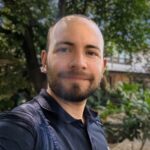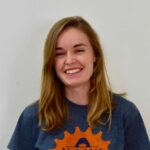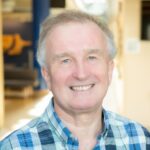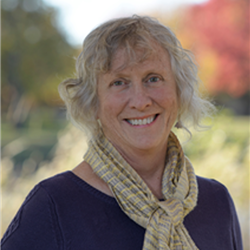
Ann Perry Witmer
UIUC

Ann Perry Witmer
UIUC
Dr. Ann-Perry Witmer is a teaching assistant professor in the Carle Illinois College of Medicine, as well as
a lecturer in several College of Engineering and College of ACES departments at the University of Illinois
Champaign-Urbana. She is the originator of the emerging discipline of Contextual Engineering, which
applies the social sciences to improve technical engineering design processes, and she leads the sizeable
Contextual Engineering Research Group, which explores the context of engineering for power system
design, environmental infrastructure, and ecosystems affected by climate change. Dr. Witmer’s work
has brought her into close association with communities on five continents, exploring place-based
knowledge and applying it to engineering solutions that best address user needs. Before joining the
University of Illinois, Dr. Witmer worked for more than a decade as a consulting engineer for public
water supplies in Wisconsin, Illinois, Minnesota, and Iowa. In addition to her civil and agricultural
engineering degrees from the University of Illinois, Dr. Witmer holds degrees in journalism and art
history from Boston University and had been a working journalist for daily newspapers in Illinois and
Pennsylvania before becoming an engineer.

Felipe Vásquez
Felipe Vásquez is an environmental engineer with a specialization in Watershed Management and currently works as Regional Project Coordinator and Deputy Social Director at the Engineers in Action Foundation in Ecuador. His professional career has focused on development cooperation, with extensive experience in the design and implementation of WASH projects. Felipe Vásquez is specialized in watershed management, water resources management, soil conservation, tropical forest management and natural resources. He also has a strong background and experience in social and community management, including knowledge management, local development and conflict management.

LUIS RAMIRO PEÑAFIEL ESPINOZA
A small river named Duden flows by their place and supplies it with the necessary regelialia. It is a paradisematic country, in which roasted parts of sentences fly into your mouth. Even the all-powerful Pointing has no control about the blind texts it is an almost orthographic life
One day however a small line of blind text by the name of Lorem Ipsum decided to leave for the far World of Grammar. The Big Oxmox advised her not to do so, because

Xiomara Ortiz
Xiomara Ortiz, born and raised in La Paz, Bolivia, is a civil engineer with a minor in environmental and sanitation engineering. She has a diverse range of work experience in Bolivia. She graduated from Universidad Mayor de San Andrés, where she completed an undergraduate project on software development for normal concrete design based on three standards. Since 2018, Xiomara has gained valuable experience in water and sanitation projects through her work with Engineers In Action (EIA) and partnerships such as Engineers Without Borders (EWB) chapters from U.S. universities. Her roles as an intern and project manager at EIA exposed her to the importance of stakeholder inclusion, pre-feasibility methods, and understanding rural communities' behaviors.
One of Xiomara's most influential experiences was working alongside engineers from the University of Illinois at Urbana-Champaign (UIUC), including Dr. Witmer. This collaboration deepened her understanding of contextual engineering and the significant impact it has on the success of projects. It also sparked her interest in concepts like "place-based knowledge”. Currently, Xiomara is pursuing a Master's degree in Agricultural and Biological Engineering at UIUC. Her research focuses on designing a water storage system for livestock use in Bodaway Gap, a chapter in the Navajo Nation, where she emphasizes the importance of contextual engineering studies.
As a delegate of the Bolivian team in the Global FEW initiative, Xiomara had the privilege of participating in the inaugural summit held at UIUC in October 2022. She describes this experience as enriching and motivating, reinforcing her commitment to working in the field of climate change. She is dedicated to applying engineering solutions to support communities in need, prioritizing the voices and concerns of the local population to ensure their active involvement and benefit from the projects.

Alexandra Timmons

Valeria Ochoa-Herrera
Dr. Ochoa-Herrera is a Professor in the Environmental Engineering Department at Universidad San Francisco de Quito USFQ, Ecuador, and serves as an Adjunct professor in Environmental Sciences and Engineering Department, Gillings School of Global Public Health, University of North Carolina – Chapel Hill, USA. Dr. Ochoa-Herrera obtained her PhD in Environmental Engineering at the University of Arizona, USA. Her research areas focus on the impacts of climate change on freshwater quality, the water-energy-food nexus, bioremediation of domestic and industrial effluents, and sustainability. She has contributed to promoting technological innovation and action against water pollution in the region. Currently, she leads multiple research projects in the highlands, Amazon and the Galapagos Islands in Ecuador, as well as in San Andres Island in Colombia for improving water quality, accessibility, and management within the framework of a circular economy approach. Currently, Dr. Ochoa-Herrera is developing laboratory and pilot-scale systems for low-maintenance and low-cost treatment of domestic and industrial effluents from mining activities. She has published 50 peer-reviewed publications, 4 books, 3 book chapters and her research has been presented in 15 international conferences.

Roza Vaez Ghaemi
UBC

James McLellan
Queens University

Vincent Amanor-Boadu
Vincent Amanor-Boadu’s research and outreach efforts encompass business
development and entrepreneurship, technology and innovation, and strategic
management, with emphasis on inter-organizational relationships. Vincent is currently
working on National Science Foundation-funded research on the economics of the
technologies at the nexus of food, energy, and water and the viability of small towns and
rural communities. Vincent has done extensive work internationally – Canada, Ecuador,
Argentina, and several African countries. This has helped him develop a clear need for
place-based knowledge in effective and sustainable solutions to local challenges. He is a
board member of Farms.com (https://www.farms.com) and Farmers Alliance Mutual
Insurance (https://fami.com). These activities allow Vincent to bring the analytical rigor of
research to the practical perspectives of leaders and present it in a clear and humorous
way.

Crispin Cholwe

Jullie Allen

Carlos Aguilera

Carlos Augusto Valdez

Ariel Douglas Urquidi

Louie Henry

